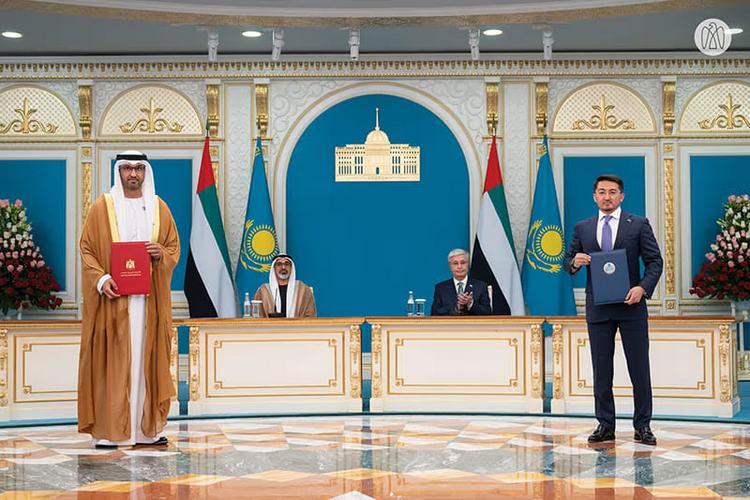- Masdar signs collaboration agreement with Samruk-Kazyna during official visit of His Highness Sheikh Khaled bin Mohamed bin Zayed Al Nahyan to Kazakhstan
- The agreement will support the development of ‘24/7’ project providing up to 500MW of baseload renewable energy and battery energy storage projects with up to 2GW capacity
- UAE and Kazakhstan Energy Ministers also exchanged documents recognizing ratification of government agreement on development of Masdar’s 1GW wind farm in Central Asian nation

His Highness Sheikh Khaled bin Mohamed bin Zayed Al Nahyan, Crown Prince of Abu Dhabi and Chairman of the Abu Dhabi Executive Council, and His Excellency Kassym-Jomart Tokayev, President of the Republic of Kazakhstan, witnessed a collaboration agreement between Abu Dhabi Future Energy Company PJSC – Masdar and Samruk-Kazyna JSC, related to the development of renewable energy and battery energy storage system (BESS) projects in Kazakhstan.

HE Suhail Al Mazrouei, UAE Minister of Energy and Infrastructure, and HE Yerlan Akkenzhenov, Minister of Energy for Kazakhstan, also exchanged documents related to the ratification of the Intergovernmental Agreement (IGA) signed at COP28 in 2023 for the development of the 1GW wind project. This marks a significant milestone toward the project’s implementation.
HE Dr Sultan Al Jaber, UAE Minister of Industry and Advanced Technology and Masdar Chairman, said:
'This agreement builds on the already strong energy partnership between our two countries and will support Kazakhstan’s ambitious renewable energy objectives. By leveraging Masdar’s expertise in renewables and battery storage technology, Kazakhstan will be able to address today’s energy needs while creating new jobs, stimulating its economy and preparing for the growing demands of tomorrow. We look forward to working closely with Samruk-Kazyna and the Government of Kazakhstan to deliver sustainable, secure energy and drive socioeconomic progress.'
Nurlan Zhakupov, CEO of Samruk-Kazyna, said:
'In line with President Tokayev’s objective of reaching carbon neutrality by 2060, Samruk-Kazyna is strengthening its efforts in low-carbon development, including through partnerships with leading international companies such as Masdar. This agreement represents a step forward toward increasing the share of renewable energy in Kazakhstan’s energy mix, using advanced technologies to support a more sustainable and resilient energy future.'
Mohamed Jameel Al Ramahi, Chief Executive Officer of Masdar, said:
'Kazakhstan is a key strategic partner for Masdar and today’s agreement further strengthens our presence in the country, building on the strong collaboration established through our existing 1GW wind and battery storage project in the Jambyl region. This agreement also strengthens our partnership with Samruk-Kazyna and we will continue to work closely together to support energy security, economic diversification and climate action.'
Kazakhstan is targeting generating 15 percent of electricity from renewable energy sources by 2030 and 50 percent by 2050. Masdar signed an agreement at COP28 with W Solar, Qazaq Green Power QGP, a Samruk-Kazyna Group company, and the Kazakhstan Investment Development Fund to develop and implement the 1GW wind project. The power purchase agreement and the investment agreement for the project were signed at COP29 in Baku last year, with construction expected to begin in 2026.
Masdar announced a significant advance in battery storage technology this year, with the launch at Abu Dhabi Sustainability Week (ADSW) of the world’s first gigascale 24/7 solar and battery storage project. Located in Abu Dhabi, the project will feature a 5.2GW (DC) solar photovoltaic (PV) plant, coupled with a 19 gigawatt-hour (GWh) BESS to deliver up to 1GW baseload power every day – the largest combined solar and BESS project in the world.
With abundant solar and wind resources, Central Asia is a key strategic region for Masdar. Beyond its footprint in Kazakhstan, the company has an active presence across the region, including Uzbekistan and Azerbaijan. Masdar is targeting a 100GW global portfolio capacity by 2030.
Source: Masdar











